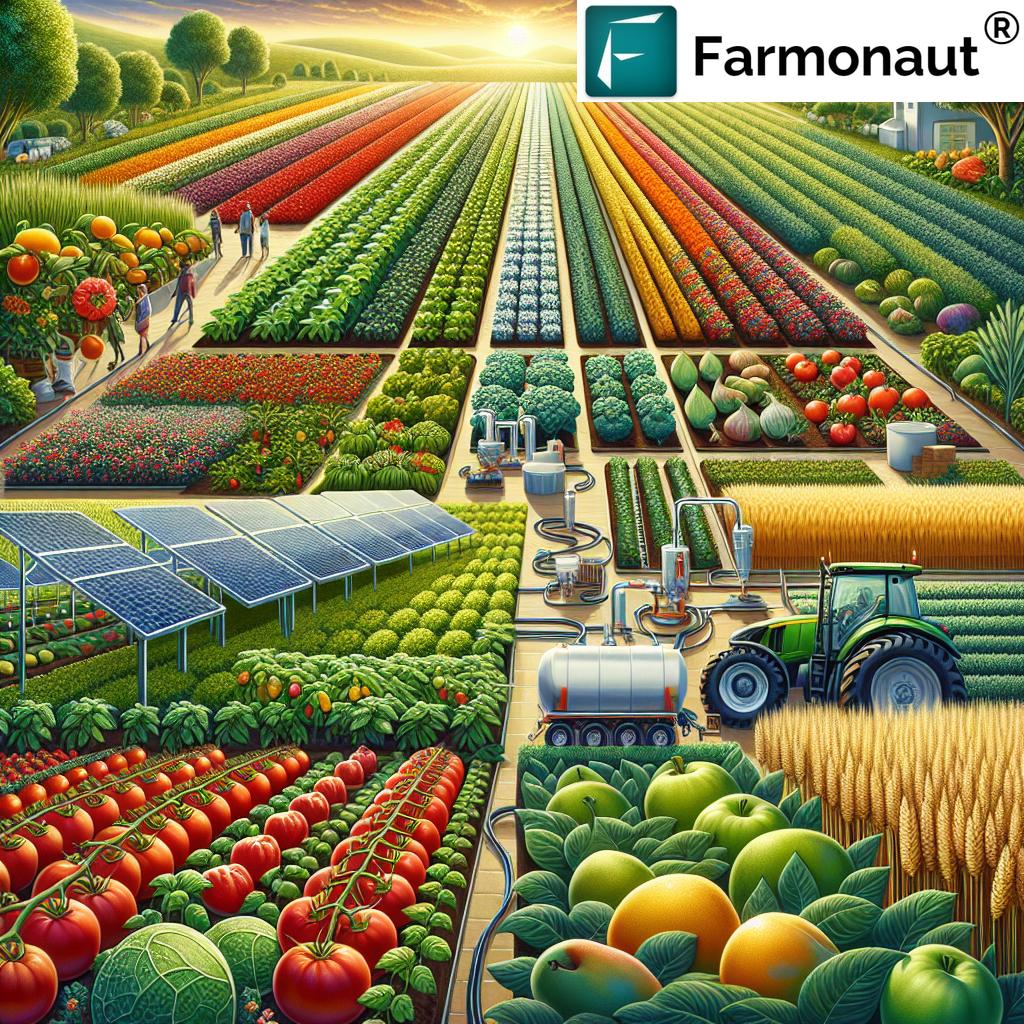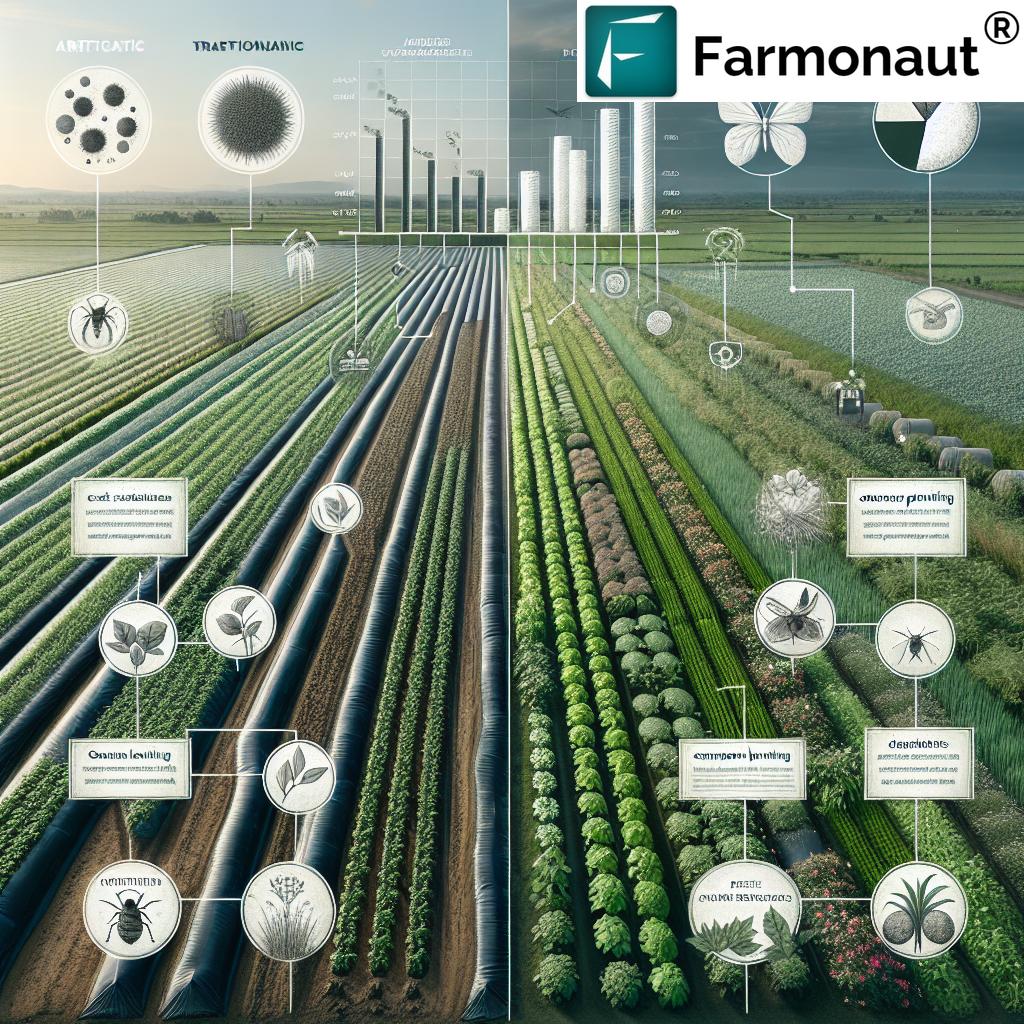Revolutionizing Agriculture: Farmonaut’s Guide to Sustainable Farming Practices and Organic Produce in Pradesh
“Farmonaut’s guide covers over 10 diverse agricultural product categories, from common vegetables to exotic fruits and spices.”

Welcome to our comprehensive guide on sustainable farming practices and organic produce in Pradesh! As we delve into the world of modern agriculture, we’ll explore how Farmonaut’s innovative agritech solutions are transforming the way we grow, manage, and distribute agricultural products. From common vegetables to exotic fruits, and from traditional farming methods to cutting-edge solar-powered agriculture, this blog post will provide valuable insights for farmers, suppliers, and agriculture enthusiasts alike.
In this era of rapid technological advancement, the agricultural sector is undergoing a significant transformation. We at Farmonaut are at the forefront of this revolution, offering satellite-based farm management solutions that make precision agriculture accessible and affordable to farmers worldwide. Our mission is to integrate innovative technology and data-driven insights into traditional farming practices, ultimately improving productivity, sustainability, and resource management in agriculture.
The Agricultural Landscape in Pradesh
Pradesh, with its diverse climate and rich soil, is home to a wide variety of agricultural products. From the lush green fields of wheat and rice to the colorful orchards of mangoes and pomegranates, the region’s agricultural bounty is truly remarkable. Let’s take a closer look at some of the key categories of agricultural products that thrive in Pradesh:
- Vegetables: Tomatoes, potatoes, onions, garlic, green peas, brinjal (eggplant), and various gourds
- Fruits: Mangoes, bananas, papayas, guavas, and citrus fruits like oranges and kinnow
- Grains: Wheat, rice, and various pulses including urad dal and soybean
- Spices: Turmeric (haldi), black pepper, and ginger
- Oilseeds: Mustard and alsi (flaxseed)
These diverse agricultural products form the backbone of Pradesh’s economy and contribute significantly to India’s food security. However, with changing climate patterns and growing population pressure, there’s an urgent need to adopt more sustainable and efficient farming practices.
Farmonaut’s Role in Revolutionizing Agriculture
At Farmonaut, we’re committed to revolutionizing agriculture through our advanced satellite-based farm management solutions. Our platform offers a range of services designed to help farmers make informed decisions, optimize resource use, and increase crop yields. Here’s how we’re making a difference:
- Satellite-Based Crop Health Monitoring: We use multispectral satellite images to monitor crop health, providing real-time insights into vegetation health (NDVI) and soil moisture levels.
- Jeevn AI Advisory System: Our AI-driven personalized farm advisory tool delivers real-time insights, weather forecasts, and expert crop management strategies.
- Blockchain-Based Product Traceability: We enable end-to-end traceability in agricultural supply chains, enhancing transparency and trust.
- Fleet and Resource Management: Our tools help agribusinesses optimize their logistics and manage agricultural machinery more efficiently.
- Carbon Footprinting: We offer carbon footprint tracking to help agribusinesses monitor and reduce their environmental impact.
To learn more about our innovative solutions, check out our web app or download our mobile apps:
Sustainable Farming Practices: A New Paradigm
“Sustainable farming practices can increase crop yields by up to 30% while reducing water usage by 20-40%.”
Sustainable farming practices are at the heart of modern agriculture, offering a way to meet current food needs without compromising the ability of future generations to meet their own needs. These practices focus on three main objectives: environmental health, economic profitability, and social and economic equity. Let’s explore some key sustainable farming practices that are transforming agriculture in Pradesh:
- Organic Farming: This method avoids the use of synthetic fertilizers and pesticides, relying instead on natural pest control methods and organic fertilizers. Organic farming is gaining popularity for crops like organic tomatoes, organic potatoes, and organic fruits.
- Precision Agriculture: Using technologies like GPS, sensors, and our satellite-based crop monitoring, farmers can apply water, fertilizers, and pesticides only where and when they are needed, reducing waste and environmental impact.
- Conservation Tillage: This practice reduces soil erosion and improves soil health by minimizing soil disturbance during planting.
- Crop Rotation: Rotating crops helps manage soil fertility, reduce pest and disease problems, and can improve soil health and crop yield.
- Integrated Pest Management (IPM): This approach uses a combination of biological, cultural, and chemical tools to manage pests while minimizing environmental risks.
Organic Produce: A Growing Trend in Pradesh
The demand for organic produce in Pradesh has been steadily increasing, driven by health-conscious consumers and environmentally aware farmers. Organic farming practices exclude the use of synthetic fertilizers and pesticides, focusing instead on natural methods of pest control and soil enrichment. Here are some popular organic products in Pradesh:
- Organic Vegetables: Tomatoes, potatoes, onions, garlic, green peas, brinjal, and various gourds
- Organic Fruits: Mangoes, bananas, papayas, guavas, and citrus fruits
- Organic Grains: Wheat, rice, and pulses
- Organic Spices: Turmeric, black pepper, and ginger
Farmonaut’s satellite-based crop monitoring system is particularly useful for organic farmers, as it helps them detect pest infestations and nutrient deficiencies early, allowing for timely interventions using organic methods.
Innovative Irrigation Systems for Water Conservation
Water scarcity is a growing concern in many parts of Pradesh. To address this, farmers are adopting innovative irrigation systems that maximize water use efficiency. Some of these systems include:
- Drip Irrigation: This system delivers water directly to the plant’s roots, reducing water waste through evaporation.
- Sprinkler Systems: These are effective for crops like wheat and vegetables, providing uniform water distribution.
- Subsurface Drip Irrigation: This advanced system delivers water and nutrients directly to the root zone beneath the soil surface.
Farmonaut’s satellite-based soil moisture monitoring helps farmers optimize their irrigation schedules, ensuring that crops receive the right amount of water at the right time.

Cutting-Edge Agricultural Machinery
Modern agricultural machinery is revolutionizing farming practices in Pradesh. These advanced tools and equipment help farmers increase productivity, reduce labor costs, and improve the overall efficiency of their operations. Some notable examples include:
- GPS-Guided Tractors: These tractors use GPS technology for precise plowing, seeding, and harvesting, reducing overlaps and improving efficiency.
- Automated Harvesters: These machines can harvest crops like wheat and rice much faster than traditional methods, reducing post-harvest losses.
- Drones: Used for crop monitoring, pest detection, and even targeted application of pesticides or fertilizers.
- Seed Drills: These machines ensure precise seed placement and spacing, improving germination rates and crop yields.
While Farmonaut doesn’t manufacture or sell agricultural machinery, our platform can help farmers optimize the use of these machines through our fleet and resource management tools.
Solar-Powered Agriculture: Harnessing the Sun’s Energy
Solar power is emerging as a game-changer in agriculture, especially in regions of Pradesh with abundant sunlight. Solar-powered systems are being used in various agricultural applications:
- Solar Water Pumps: These pumps use solar energy to draw water from wells or rivers for irrigation, reducing dependence on grid electricity or diesel.
- Solar Dryers: Used for drying crops like fruits, vegetables, and spices, preserving their quality and extending shelf life.
- Solar-Powered Cold Storage: These facilities help reduce post-harvest losses by keeping produce fresh for longer periods.
- Solar Fencing: Protects crops from wild animals while being environmentally friendly.
Farmonaut’s platform can help farmers monitor the performance of their solar-powered systems and optimize their usage for maximum efficiency.
Exploring Exotic Crops in Pradesh
While traditional crops form the backbone of agriculture in Pradesh, there’s a growing interest in exotic and high-value crops. These crops offer farmers the opportunity to diversify their income and tap into niche markets. Some exotic crops gaining popularity in Pradesh include:
- Avocados: With increasing health consciousness, avocado cultivation is on the rise in suitable climatic zones of Pradesh.
- Dragon Fruit: This exotic fruit is gaining popularity due to its unique appearance and nutritional benefits.
- Kiwi: Some hilly regions of Pradesh are experimenting with kiwi cultivation.
- Exotic Vegetables: Crops like broccoli, zucchini, and colorful bell peppers are finding their way into Pradesh’s farms.
Farmonaut’s Jeevn AI Advisory System can provide valuable insights for farmers venturing into these new crops, offering personalized advice on cultivation practices, pest management, and optimal harvesting times.
The Role of Pulses and Oilseeds in Sustainable Agriculture
Pulses and oilseeds play a crucial role in sustainable agriculture and food security in Pradesh. These crops not only provide essential nutrients but also contribute to soil health:
- Pulses: Crops like urad dal, moong dal, and chickpeas (chana) are nitrogen-fixing, improving soil fertility naturally.
- Oilseeds: Mustard, alsi (flaxseed), and soybean are important cash crops that also contribute to crop rotation practices.
Farmonaut’s satellite-based crop monitoring is particularly useful for these crops, helping farmers track their growth stages and optimize inputs for better yields.
Sustainable Farming Practices Comparison
| Farming Aspect | Traditional Method | Sustainable Practice | Benefits |
|---|---|---|---|
| Irrigation | Flood irrigation | Drip irrigation | Water conservation, improved crop yield |
| Pest Control | Broad-spectrum pesticides | Integrated Pest Management (IPM) | Reduced chemical use, environmental protection |
| Soil Management | Intensive tillage | Conservation tillage | Improved soil health, reduced erosion |
| Fertilization | Synthetic fertilizers | Organic compost, crop rotation | Enhanced soil fertility, reduced chemical runoff |
| Crop Monitoring | Manual inspection | Satellite-based monitoring (Farmonaut) | Early detection of issues, optimized resource use |
The Future of Agriculture in Pradesh
As we look to the future, the agricultural landscape in Pradesh is poised for significant transformation. The integration of technology, sustainable practices, and innovative farming methods is creating new opportunities and challenges. Here are some key trends we expect to see:
- Increased Adoption of Precision Agriculture: More farmers will leverage technologies like Farmonaut’s satellite-based monitoring to optimize their farming practices.
- Growth in Organic Farming: The demand for organic produce is expected to continue rising, encouraging more farmers to transition to organic methods.
- Climate-Smart Agriculture: With changing climate patterns, farmers will increasingly adopt practices that are resilient to weather variations and extreme events.
- Diversification of Crops: Farmers may increasingly experiment with new and exotic crops to meet changing consumer demands and spread their economic risks.
- Increased Use of Renewable Energy: Solar-powered agricultural systems are likely to become more prevalent, reducing the sector’s carbon footprint.
Farmonaut’s Commitment to Sustainable Agriculture
At Farmonaut, we’re committed to supporting farmers in their journey towards more sustainable and productive agriculture. Our platform is continuously evolving to meet the changing needs of farmers and the agricultural sector. Here’s how we’re preparing for the future:
- Enhancing AI Capabilities: We’re continually improving our Jeevn AI Advisory System to provide even more accurate and personalized advice to farmers.
- Expanding Satellite Data Analysis: We’re working on incorporating more advanced satellite data to provide even more detailed insights into crop health and soil conditions.
- Improving Blockchain Integration: We’re enhancing our blockchain-based traceability solutions to provide even greater transparency in agricultural supply chains.
- Developing New Partnerships: We’re always looking for opportunities to collaborate with other agritech companies and research institutions to bring the latest innovations to our users.
For developers interested in integrating our technology into their own solutions, we offer a robust API. Check out our API Developer Docs for more information.
Conclusion: Embracing a Sustainable Future
As we’ve explored in this guide, the future of agriculture in Pradesh is bright, filled with opportunities for innovation and sustainable growth. From traditional crops to exotic fruits, from age-old farming methods to cutting-edge technologies, the agricultural sector is evolving rapidly.
At Farmonaut, we’re proud to be at the forefront of this agricultural revolution. Our satellite-based farm management solutions are helping farmers across Pradesh and beyond to optimize their operations, increase yields, and adopt more sustainable practices. We believe that by embracing technology and sustainable farming methods, we can ensure food security, protect our environment, and create a thriving agricultural sector for generations to come.
We invite you to join us on this journey towards a more sustainable and productive agricultural future. Whether you’re a small-scale farmer, a large agribusiness, or simply an enthusiast interested in the future of farming, Farmonaut has solutions to meet your needs.
Farmonaut Subscriptions
Frequently Asked Questions
- What is precision agriculture?
Precision agriculture is a farming management concept that uses technology to observe, measure, and respond to variability in crops. It allows farmers to optimize returns on inputs while preserving resources. - How does Farmonaut’s satellite-based crop monitoring work?
Farmonaut uses multispectral satellite images to monitor crop health, providing insights into vegetation health (NDVI) and soil moisture levels. This data helps farmers make informed decisions about irrigation, fertilizer usage, and pest management. - What are the benefits of organic farming?
Organic farming avoids the use of synthetic fertilizers and pesticides, promoting soil and water conservation, reducing pollution, and producing healthier food. It also often results in higher biodiversity on farms. - How can solar power be used in agriculture?
Solar power can be used for various agricultural applications, including powering irrigation pumps, drying crops, powering cold storage facilities, and electrifying farm equipment. - What is blockchain-based traceability in agriculture?
Blockchain-based traceability allows for the transparent and secure tracking of agricultural products from farm to consumer. It enhances trust in the supply chain and helps prevent fraud.
We hope this guide has provided valuable insights into the world of sustainable farming practices and organic produce in Pradesh. Remember, the future of agriculture is in our hands, and with the right tools and knowledge, we can create a more sustainable and productive agricultural sector. If you have any questions or would like to learn more about how Farmonaut can help you in your agricultural journey, please don’t hesitate to reach out to us.








